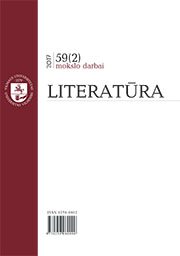Семантика дикой природы в творчестве Н. М. Карамзина: был ли Карамзин Русским Генри Торо
The Semantics of Wild Nature in N. M. Karamzin’s Works: Was Karamzin the Russian Henry Thoreau?
Author(s): Julija SnežkoSubject(s): Aesthetics, Semantics, Russian Literature, Theory of Literature
Published by: Vilniaus Universiteto Leidykla
Keywords: Karamzin; Thoreau; Wild nature; Landscape; Space; Enlightenment;
Summary/Abstract: This article deals with the semantics of wild nature, found in Karamzin’s works. The author tries to answer the question of what Karamzin himself considered European or Russian wild nature to be. The concretization of the meaning of wild nature in Karamzin’s works seems relevant if we have in mind the big number of literary and cultural researches (within the frame of ecocriticizm and not only) that analyze wild nature. Though a considerable amount of scientific literature has been devoted to the theme of nature in Karamzin’s works, the notion of wild nature hasn’t been systematically investigated. In this article, attention is paid to the contexts in which nature is referred to as “wild.” Here, it is shown that Karamzin’s relation to wild nature was ambivalent. The semantics of European and Russian wild nature are different and have both positive and negative aspects. This difference is explained by the specifics of the aesthetical optics of the narrator (the aesthetics of the picturesque or the sublime) and by his narrative position (a personalized relationship toward nature or a governmental point of view). Wild nature that is aesthetically attractive to Karamzin is the one that minimally experienced the influence of man and is part of picturesque aesthetics, or the nature that it is the quintessence of the sublime – the mountains. However, wild nature that didn’t experience the influence of man and that is not part of the picturesque aesthetics, as it is with the bigger part of Russian nature (steppes, forests, marshes, empty spaces) does not have such a pleasing effect; on the contrary, it frightens the narrator, and from the governmental point of view – which Karamzin shares – it should be controlled and subdued. In this article, it is concluded that Karamzin was not the Russian Henry Thoreau, and his relationship toward wild nature, both positive and negative, was mostly based on the ideology of the Enlightenment.
Journal: Literatūra
- Issue Year: 59/2017
- Issue No: 2
- Page Range: 48-64
- Page Count: 17
- Language: Russian

